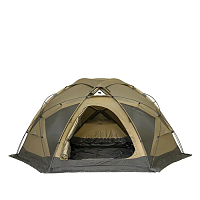Cart
Essential Tips for Winter Tent Camping
Introduction:
Winter tent camping can be an exciting and rewarding experience for outdoor enthusiasts. However, it requires careful planning and preparation to ensure a safe and enjoyable adventure. In this article, we will provide you with essential tips to make your winter tent camping trip a success. From choosing the right camping tent to staying warm with a wood stove, these tips will help you navigate the challenges of winter camping and create unforgettable memories.
1. Selecting the Right Camping Tent:
When it comes to winter camping, choosing the right tent is crucial for your comfort and safety. Look for a four-season or winter-specific tent designed to withstand cold temperatures and snowfall. These tents are typically made with durable materials, have sturdy pole structures, and feature reinforced rainflies to provide insulation and protect against harsh weather conditions. Consider the tent's capacity, ventilation options, and ease of setup when making your selection.
2. Insulating the Tent:
To keep warm during winter tent camping, proper insulation is essential. Start by selecting a tent with a full-coverage rainfly to create an extra barrier against cold air. Additionally, use a footprint or groundsheet to insulate the tent floor from the cold ground. Place foam or inflatable sleeping pads underneath your sleeping bags to provide insulation and cushioning. Consider using insulated sleeping pads for maximum warmth. Finally, seal any gaps or openings in the tent to prevent drafts and keep the interior cozy.
3. Utilizing a Wood Stove for Heating:
A wood stove can be a game-changer for winter tent camping. It provides effective heating and creates a cozy atmosphere inside the tent. Look for a portable wood stove specifically designed for camping, with features such as a spark arrestor and a damper for temperature control. Before your camping trip, familiarize yourself with the setup and operation of the wood stove to ensure safe usage. Remember to pack firewood and follow Leave No Trace principles when collecting wood from the surrounding area.
4. Proper Ventilation:
While insulation is important, it's equally crucial to maintain proper ventilation inside the tent. Moisture from breath and cooking can accumulate, leading to condensation and potential dampness. Ensure that your tent has vents or mesh panels to allow airflow and minimize condensation. Proper ventilation will help regulate humidity levels and prevent the formation of frost inside the tent. However, be mindful of excessive airflow during extremely cold conditions, as it can lower the overall temperature inside.
5. Dressing in Layers:
Layered clothing is essential for staying warm in winter camping conditions. Wear a moisture-wicking base layer to keep sweat away from your body. Add insulating layers such as fleece or down jackets, and top it off with a waterproof and windproof outer shell. Opt for synthetic or wool materials that retain heat even when damp. Don't forget to wear warm socks, gloves, and a hat to protect extremities from the cold. Layering allows you to adjust your clothing according to activity level and weather conditions.
6. Proper Food and Hydration:
In cold weather, it's vital to maintain proper nutrition and hydration. Pack high-energy, non-perishable foods that are easy to prepare and provide a good balance of carbohydrates, proteins, and fats. Consider warm meals and hot drinks to help keep you warm from the inside. Bring a thermos to store hot water or beverages throughout the day. Stay hydrated by drinking plenty of fluids, even if you don't feel as thirsty as you would in warmer temperatures.
7. Safety Precautions:
Winter camping poses unique challenges, so it's crucial to prioritize safety. Check weather forecasts and be prepared for changing conditions. Inform someone about your camping plans, including your expected return date. Pack a well-stocked first aid kit and familiarize yourself with basic winter survival skills. Be cautious of potential hazards such as avalanches, thin ice, and falling branches. It's also advisable to camp with a buddy for added safety and support.
8. Leave No Trace Principles:
Practicing Leave No Trace principles is particularly important during winter camping. Respect the natural environment and minimize your impact on the surroundings. Follow designated trails, properly dispose of waste, and avoid damaging vegetation. When using a wood stove, ensure that you leave your campsite free of ashes and unburned materials. Respect wildlife and observe from a distance to avoid disturbing their natural habitats.
Conclusion:
- Contact Us
-

About Pomoly
Pomoly is a leading camping brand specializing in hot tents and tent stoves. We are camping life explorer, Follow Page / Join Group, let's make camping enjoyful together!
Working Hours
Mon-Fri, 09:00 - 17:00

- Company Info
- NEWS
- About us
- Pomoly Name
- Leave-No-Trace
- Contact Now
- Facebook Group
- YouTube Learning
- Contact Us
- Topic Collections
- Policies & Terms
- Payment Policy
- Shipping Policy
- Return & Refund
- Privacy Policy
- Terms of Use
- Tax Policy
- Website Disclaimer
- Safety Disclaimer
- Warranty Policy
- Promotion Policy
- Pre-order Policy
- INTELLECTUAL PROPERTY RIGHTS
- Dealers Agreement And Terms
- Become Affiliate
- User Center
- Forget Password
- My Orders
- Tracking Order
- My Account
- Register
- Popular Searches
-
Tipi Tents Dome Tents Camping Tent Hammock Stove Camping Camping Pellet Stove Circle 6 Titanium Water TankDome X Locomotive 20 LEO 2 camping tent T-Brick 2.0 T1 2.0 tent stove Dweller wood stove Oroqen 2.0 Chimney Water Tank Lumberjack STOVEHUT Bromance 70 Tipi Pomoly Coupon Baker Oven Stove Titanium elbow Fire Pits Tent Stove titanium Stove Outdoor Pellet Stove
keebon pellet stove






